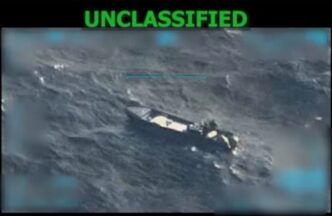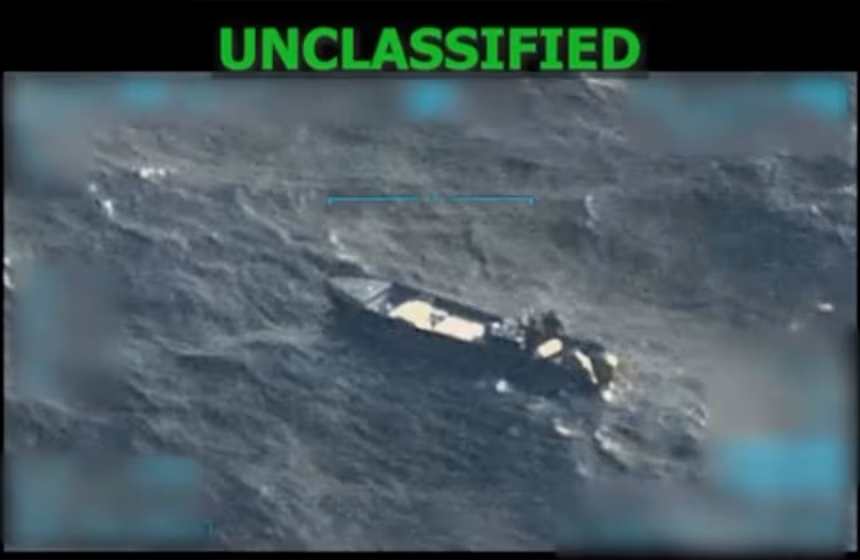Executive Summary
The Story So Far
Why This Matters
Who Thinks What?
The U.S. military killed three individuals in a recent strike on a vessel in international waters near South America, which President Trump described as a “kinetic strike” against alleged “narcoterrorists” transporting illegal narcotics from Venezuela. This incident, announced by Trump on Truth Social on Monday, marks the second such deadly operation in the region within two weeks, following an earlier strike that killed 11 people.
Details of the Operation
President Trump stated that the strike, conducted on his orders in the SOUTHCOM area of responsibility, targeted “extraordinarily violent drug trafficking cartels and narcoterrorists.” He asserted that these individuals, identified from Venezuela, were in international waters transporting illegal narcotics “headed to the US,” which he characterized as a “deadly weapon poisoning Americans.” Trump added that these groups “pose a threat to U.S. National Security, Foreign Policy, and vital US Interests,” confirming that three male “terrorists” were killed and no U.S. forces were harmed.
This latest action follows a previous strike approximately two weeks prior, where the U.S. military killed 11 individuals. That earlier operation was allegedly linked to the Venezuelan Tren de Aragua gang, though the Trump administration has provided limited specific details regarding either incident. Defense Secretary Pete Hegseth, when pressed for answers after the first strike, declined to offer specifics but maintained the U.S. had “the absolute and complete authority to conduct that.”
Regional Tensions and Criticism
The strikes occur amidst heightened tensions with Venezuela, a situation underscored by recent U.S. military deployments to the region, including the Iwo Jima Amphibious Ready Group, the 22nd Marine Expeditionary Unit, and 10 F-35 fighter jets to Puerto Rico. Venezuelan Foreign Minister Yván Gil stated last week that Venezuela is “not betting on conflict” with the U.S., “nor do we want conflict.”
However, the administration’s actions have drawn scrutiny. CNN reported last week that Defense Department officials did not present conclusive evidence linking the targets of the first attack to Tren de Aragua, nor could briefers definitively determine the vessel’s destination. A source also indicated to CNN that the boat had turned around at one point, raising questions about whether it posed an immediate threat.
Senator Jack Reed, the ranking member of the Senate Armed Services Committee, criticized the initial strike, stating, “There is no evidence – none – that this strike was conducted in self-defense.” Reed emphasized that under both domestic and international law, the U.S. military lacks authority to use lethal force against a civilian vessel unless acting in self-defense.
Administration’s Stance
Despite the criticisms, President Trump has maintained that the targeted vessels were en route to the U.S. Defense Secretary Hegseth has echoed this sentiment, suggesting that anyone trafficking drugs “heading for the United States… that will have lethal consequences.” During a visit to Fort Benning, Georgia, on September 4, Hegseth asserted, “We knew exactly who they were, exactly what they were doing, what they represented, and why they were going where they were going.” When a reporter inquired how this information was known, Hegseth responded, “Why would I tell you that?”
Both Secretary Hegseth and Secretary of State Marco Rubio have indicated that further actions against drug cartels could be forthcoming. Rubio stated during a trip to Mexico and Ecuador after the first strike that the U.S. is “going to wage combat against drug cartels that are flooding American streets and killing Americans.”
Summary of Events
The U.S. military has conducted two deadly strikes in international waters, resulting in 14 fatalities, targeting what President Trump describes as “narcoterrorists” from Venezuela transporting illegal drugs. While the administration asserts the necessity and legality of these operations for national security, the actions have prompted questions from media and lawmakers regarding specific evidence, self-defense justification, and the broader context of U.S. foreign policy in the region.








